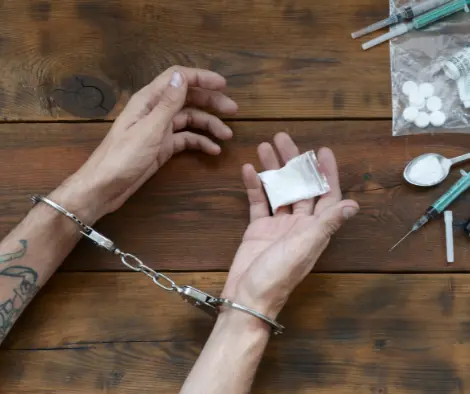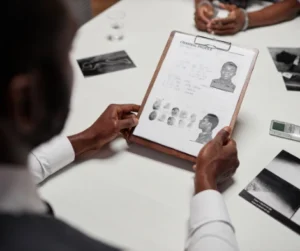

The Weight of a Drug Charge
Imagine being pulled over for a routine traffic stop. The officer asks to search your car, and before you know it, you’re in handcuffs facing serious drug charges. Whether it’s drug possession or accusations of trafficking, the penalties can be severe, impacting everything from your freedom to your future job prospects. Understanding the legal process, potential defenses, and sentencing factors is crucial when facing drug-related charges.
Drug offenses range from simple possession to large-scale trafficking. The outcome of a case depends on the type of drug, the amount found, prior criminal history, and the legal strategy employed by the defense.
Drug Possession: Understanding the Charge
Possession of an illegal substance is one of the most common drug-related offenses. It generally refers to an individual knowingly having controlled substances such as marijuana, cocaine, methamphetamine, or unauthorized prescription drugs.
Types of Drug Possession
- Actual Possession – When the drugs are found directly on a person, such as in their pocket.
- Constructive Possession – When drugs are found in a place under the person’s control, such as their car or home.
- Possession with Intent to Distribute – If law enforcement finds large quantities of drugs, packaging materials, or scales, they may assume intent to sell, leading to more severe penalties.
According to the Federal Bureau of Prisons, nearly 45% of inmates in federal prisons are serving sentences for drug-related offenses. Even a minor possession charge can result in fines, probation, or jail time, depending on the severity and jurisdiction.
Defenses Against Drug Possession Charges
- Unlawful Search and Seizure –If law enforcement collected evidence without a valid warrant or sufficient probable cause, the case may be subject to dismissal.
- Lack of Knowledge – If the defendant was unaware of the presence of drugs, the defense can argue they had no control over the substance.
- Planted Evidence – Cases of police misconduct, where officers plant drugs to frame an individual, can lead to dismissal if proven.
- Medical Necessity – In some states, possession of marijuana is legal for medical purposes, providing a valid defense.
Understanding the nuances of a possession charge is key, but trafficking defense requires a different approach, as the penalties are much harsher.
Trafficking Defense: Fighting Serious Drug Charges
Drug trafficking is a felony offense that carries severe consequences. It involves the manufacturing, distribution, or transportation of controlled substances across state or national borders. Unlike possession, trafficking is prosecuted more aggressively, often leading to mandatory minimum sentences.
Factors That Influence Drug Trafficking Charges
- Quantity of the Drug – Larger amounts typically result in harsher penalties.
- Intent to Distribute – Evidence such as large sums of cash, packaging materials, or transportation of drugs can indicate distribution.
- Jurisdiction – Federal drug trafficking laws are stricter than state laws and often carry harsher penalties.
- Presence of Weapons – If firearms are found along with the drugs, sentencing can increase significantly.
The U.S. Sentencing Commission reports that drug trafficking convictions lead to an average prison sentence of 5-10 years, with penalties increasing for repeat offenders.
Defense Strategies for Drug Trafficking Charges
- Entrapment – If law enforcement coerced or tricked a person into committing the crime, the charges could be dismissed.
- Lack of Intent – The defense can argue that the accused had no knowledge of the drugs, especially in cases of passengers in vehicles or shared living spaces.
- Insufficient Evidence – To secure a conviction for trafficking, prosecutors must establish the defendant’s involvement beyond a reasonable doubt. If the evidence is insufficient or purely circumstantial, the case may be dismissed.
- Chain of Custody Issues – If the evidence was mishandled or improperly documented, it can be deemed unreliable.
Drug trafficking cases require aggressive defense strategies and skilled legal representation to challenge the prosecution’s case effectively.
Case Study: A Wrongful Drug Conviction Overturned
The Arrest and Conviction
In 2012, Marcus Johnson was arrested in Texas after law enforcement found five pounds of cocaine in a rental car he was driving. Despite his insistence that he was unaware of the drugs in the vehicle, he was convicted and sentenced to 15 years in prison.
The Appeal and Legal Defense
After spending six years behind bars, Marcus’s new attorney uncovered evidence that another individual had rented the car and stashed the drugs without Marcus’s knowledge. Surveillance footage from the rental agency showed a third party handling the car before Marcus picked it up.
The attorney argued that Marcus had no knowledge of the drugs, and there was insufficient proof to link him to drug trafficking.
The Verdict
A state appellate court reviewed the case and overturned Marcus’s conviction, ruling that the evidence was circumstantial and did not prove beyond a reasonable doubt that he was involved in trafficking. He was released in 2018, a victim of misidentification and weak prosecution evidence.
This case highlights the importance of strong legal representation and how flawed evidence can lead to wrongful convictions.
Conclusion
Navigating drug charges can be overwhelming, but understanding the legal process, potential defenses, and sentencing factors can make a significant difference in the outcome of a case. Whether facing possession or trafficking charges, the right defense strategy and legal representation are critical in ensuring justice is served.
Frequently Asked Questions (FAQs)
- What is the difference between drug possession and drug trafficking?
Drug possession usually refers to having a small amount for personal use, whereas trafficking involves larger quantities meant for distribution and comes with more severe penalties. - Can a first-time drug offense result in jail time?
Yes. Although some jurisdictions offer diversion programs or probation for first-time offenders, others impose mandatory jail sentences, especially for more serious substances. - How can I fight a drug possession charge?
Common defenses include lack of knowledge, unlawful search and seizure, and insufficient evidence. An attorney can help determine the best strategy. - What are mandatory minimum sentences for drug trafficking?
Federal law imposes mandatory minimums starting at 5-10 years, depending on the drug type and quantity. Some states have stricter sentencing laws. - Can drug charges be expunged from a criminal record?
In some states, minor drug convictions can be expunged or sealed after a certain period, depending on the severity of the charge and compliance with legal requirements.



